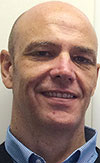
Fraud is nothing new to most industries in South Africa and around the world. In the insurance industry, however, fraud ranges from individuals ‘trying their luck’ to sophisticated criminal syndicates focused on stealing as much as they can from insurance companies.
A common refrain among those who are criminally inclined is that this fraud is not really a crime because people are stealing from insurance companies, which have plenty of money. The reality, however, is that these companies make their money from premiums their customers pay, meaning the more fraud they suffer, the higher the premiums will climb in order to meet the needs of legitimate clients.

According to Garth De Klerk, CEO of the SAICB, the tough economic conditions in South Africa have resulted in a higher number of false claims over recent years as many people try to alleviate their financial predicaments by making fraudulent, low-value insurance claims for, among other things, lost cellphones, TVs, tyres and so on. These claims traditionally go unnoticed unless the claimant makes a mistake because they are common and for smaller amounts of money.
This is changing, however, as insurance companies increase their use of technology to validate claims (although the traditional human anti-fraud element is still in use). Today, technology is a must for these organisations as they strive to provide a better and faster service to customers. At the same time, technology is used to provide risk profile modelling, which is able to flag suspicious claims or claimants.
It’s not only individuals at work in committing fraud. Crime syndicates are just as active in designing fraudulent schemes for higher claim amounts. These schemes involve multiple people and sophisticated strategies to defraud insurance companies, especially in areas such as car, life and funeral coverage, although they are not limited to these areas.
Here again, the combination of technology and people, as well as co-operation between organisations within the industry and authorities makes an enormous difference in curbing fraud.
Intelligence gathering, analysis and sharing
The South African Insurance Crime Bureau (SAICB) was launched in 2008 after a four-year investigation by the South African Insurance Association (SAIA) on how to best address crime and fraud committed across companies in the short-term insurance industry. De Klerk explains that the organisation is a non-profit, non-commercial enterprise focused on fighting insurance crime across the industry.
There are currently 21 organisations that are members of the SAICB, mostly in the short-term insurance industry, but with other companies slowly realising the real benefits of membership.
De Klerk describes the organisation as a fusion centre in the middle of the insurance landscape where data is collected from its various members, analysed and the results shared with members and/or authorities which act against fraudsters. The organisation brings the industry and related parties, from SAPS to the Department of Home Affairs, the Hawks and the NPA together to discuss ways and means of eliminating fraud.
The SAICB does not only deal with information, however, it also has feet on the ground as it works with various authorities to address the fraud issue and go after perpetrators. De Klerk notes that the use of intelligence has had a remarkable impact on the fraud committed in member companies.
“Our members have seen an average return on investment (ROI) to the various companies of 230%,” he states. This makes a significant difference to the amount lost to fraud each year, and consequently to the bottom line.
Advice to individuals and companies
As noted above, insurance fraud affects everyone, the insurance companies as well as individual and business customers. It is therefore imperative that everyone plays their part in ensuring that legitimate clients receive good service and fast resolution to their claims.
Companies need to understand that fraud is real and does impact their bottom line, from paying higher premiums to longer resolution times. If corporate clients make the effort to ensure their activities are in accordance with their insurance policies and focus on preventing fraud, everyone wins in the long run.
De Klerk says individuals can also assist in helping themselves in this endeavour by not ignoring the fraud their insurers deal with on a daily basis. Being open, honest and transparent with your insurance company is key to stress-free dealings in this regard. Companies and individuals should not try to hide things from their insurers and must read and understand their policies. Even unintentional false claims cause problems for both sides and can result in delayed payments or unnecessary investigations.
Insurance companies are professional organisations that are run according to strict governance rules. Clients should treat them as such and also adhere to professional and ethical conduct in their own businesses, as well as any claims they have, thereby improving the industry and service levels for everyone – except the criminals.
For more information on the SAICB, go to www.saicb.co.za

© Technews Publishing (Pty) Ltd. | All Rights Reserved.